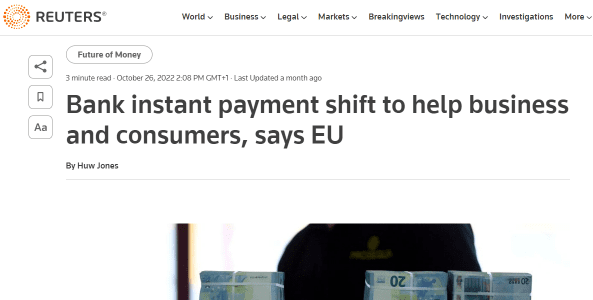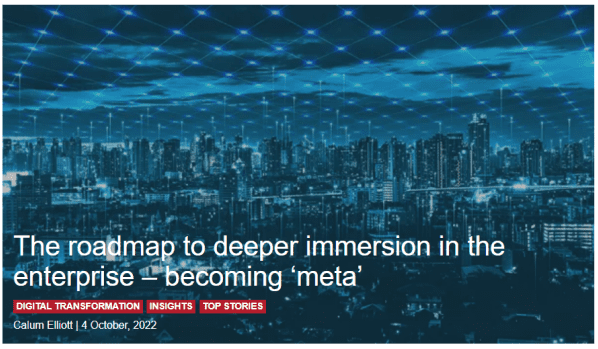One-of-a-kind October - October's client coverage highlights
October was another busy month for the Babel team, with issues jumps and drastic industry developments at every turn. I have collated our coverage highlights from what was a very busy and successful month for Babel and its clients. You can read my top picks below...
A shift in the open banking regulatory landscape
October was a big month for the payments and open banking industries in Europe, with a landmark European Commission regulatory announcement that mandated instant payments around the EU. But what exactly does this mean? This mandate creates a fairer playing field for the payments sector, and will create an environment that will allow real-time to become the only time for payments. More specifically, this law will require banks across the EU to receive and offer instant payment services for a fee that is the same or lower than they charge for traditional credit transfers.
Instant payments unlock a realm of opportunity for businesses and consumers alike, and the payment method is truly a game-changer for the sector. One example of the benefits of open payments is that they have significantly lower transaction costs in comparison to credit card and debit card fees. Credit card fees currently stand at an average of 3.75% per transaction, which is cutting into businesses' profits and causing them to raise the price of goods and services, which is not ideal amidst a cost-of-living crisis. This is just one of the many problems that the adoption of open payments can help to solve, as it will mean that businesses will not be forced to raise prices - good news for consumers in what is a challenging time.
Volt's CEO and Founder, Tom Greenwood, told Reuters that "by mandating instant payments, the biggest blockers to open banking payments becoming mainstream are instantly solved," demonstrating that this mandate is an exciting development for the payments industry. Tom's commentary was also featured in the likes of CNBC, PYMNTS and Yahoo Finance.

Meta profits plummet and study shows that consumers are concerned about data protection and privacy in the Metaverse
�
Towards the end of October, Meta announced its latest round of earnings, revealing profits had plummeted by more than 50% in Q3 2022 alone. A recent study commissioned by Acquia revealed that only 28% of UK consumers are excited by the Metaverse. Many also expressed their concerns about data protection and privacy in the Metaverse, with 56% of UK consumers saying that this was a key concern for them. This comes as no surprise with the number of privacy lawsuits that Meta has faced, coupled with the fact that consumers are becoming increasingly aware of poor data protection practices.�
�
Acquia's study also revealed that only 28% of consumers in the UK are excited by the Metaverse and this lack of enthusiasm is shared around the globe, with only 34% of consumers in the US and 45% of consumers in France showing excitement towards the metaverse.
�
VP of Corporate Marketing at Acquia, Tom Bianchi, told Computing that "the Metaverse promises rich opportunities for marketers to deliver digital experiences that can create and strengthen consumer loyalty with the brand. However, our research suggests that there are still some pretty significant barriers that will need to be overcome before consumers can truly get excited". You can read the full article in the link above.

The Metaverse could transform your future job...
Building on this theme of the untapped potential of the Metaverse, our client Ciena also commissioned a piece of research about the Metaverse, this time focusing on how the Metaverse could transform future jobs.�
�
According to Ciena's research, 71% of professionals can see the Metaverse becoming a part of existing work practices. Not only this, but 40% of respondents believe that their business will move into more immersive environments in the next two years. This move to a more immersive environment is fueled by recent developments in technology, such as Augmented Reality (AR), Virtual Reality (VR) and also Mixed Reality (MR).�
�
Ciena's Vice President and Chief Information Officer, Craig Williams, also talks about how within the context of the Great Resignation, we can see why creating the best employee experiences using technology has become a priority for many businesses. He also notes that the Metaverse ensured the same flexibility that employers now expect while taking isolation and disconnection out of the equation. You can read the full article in Intelligent CIO here.

The importance of creating smart digital customer experience journeys
�
Customer experience can be the difference between the success or failure of a business, and it is often a highly overlooked element of a business strategy. It is very important for businesses to provide tailored, seamless and enjoyable customer experiences across multiple channels, whether these channels are social media, email or via phone calls.�
Once businesses begin to realise the potential of truly understanding customer behaviour through analysing the customer data that they have, they will be able to introduce consistency into their approach which is highly valued by customers.
CTO at Paragon Customer Communications, Stephen Lester, told Raconteur that �while it may seem boring, offering consistent information, service and simplicity to your customer is a huge benefit�. You can read more about how to create smart digital customer experience journeys and why these journeys are so important in the link above.

�
And there you have it, another month of great coverage secured by the Babel team. If you would like to hear more about how Babel can help you to cut through the noise and secure some outstanding opportunities for your business, please do get in touch.




.jpg)




